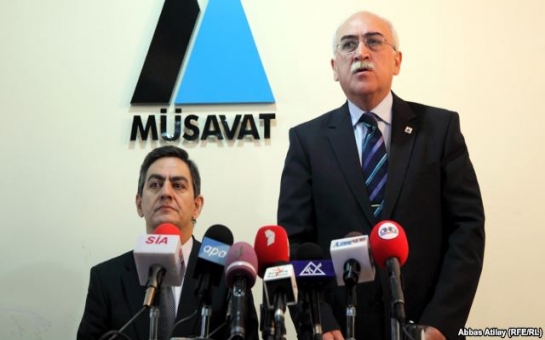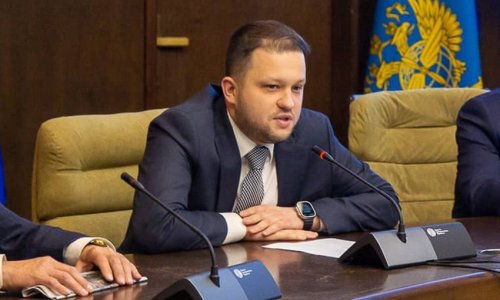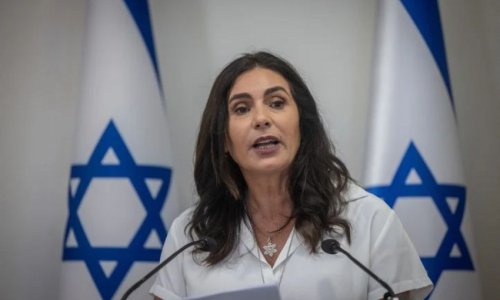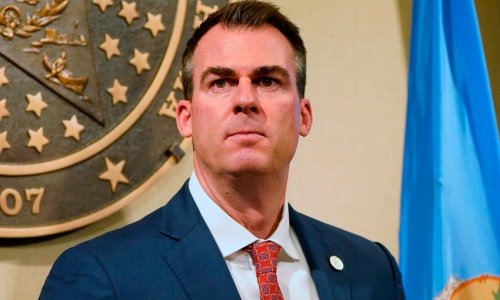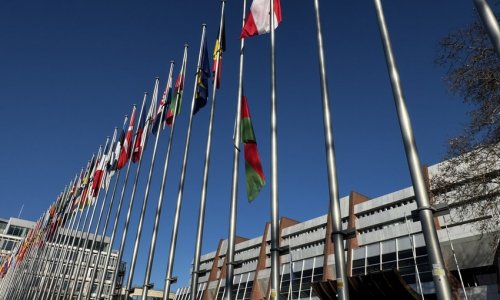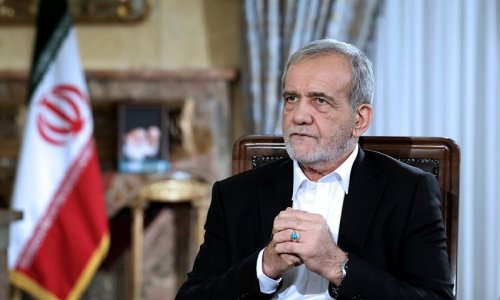The future of the National Council of Democratic Forces (NSDS), the most recent alignment of Azerbaijani opposition forces, is in doubt following the withdrawal this week from its ranks of the 12 members representing the Musavat Party, one of Azerbaijan's oldest and most influential opposition parties.
A statement announcing that decision did not explain the rationale for the move. It did, however, make the point that selecting and backing a single opposition candidate in the October 9 presidential election had not resulted in an opposition victory, and stressed the need for "new tactics." At the same time, in a seeming contradiction, the statement affirmed that the NSDS had fulfilled the purpose for which it was created.
The NSDS was the brainchild of Rustam Ibragimbekov, a respected Azerbaijani filmmaker domiciled in Moscow who has harshly criticized the political and moral climate in Azerbaijan. It was established in May 2013 following two months of consultations between Eldar Namazov, who had quit his post as an adviser to then-President Heydar Aliyev in October 1999 and subsequently founded the public forum In the Name of Azerbaijan; Musavat Party Chairman Isa Qambar; and Azerbaijan Popular Front Party (AXCP) Chairman Ali Kerimli.
The stated objectives of the NSDS were
to ensure a peaceful transition, by means of democratic elections, from authoritarianism to democracy;
to preserve stability during that transition;
to uphold the supremacy of the law and protect human rights;
to defend Azerbaijan's independence and territorial integrity.
The NSDS differed from previous opposition alliances in two respects. First, it encompassed a broader spectrum of political forces (nationalists, liberals, Islamists, pro-Western, pro-Russian, pro-Turkish, and pro-Iranian, plus representatives of the country's ethnic minorities.)
And second, it consists of individuals, rather than political parties and movements. The 129 original members included Namazov; Qambar and 11 other Musavat representatives; Kerimli; Open Society Party Chairman Sulhaddin Akper; Civic Solidarity Party Chairman Sabir Rustamkhanli; Liberal Party of Azerbaijan Chairman Avaz Temirkhan; Liberal Party of Azerbaijan chair Lala-Shovket Haciyeva; Aydynlar Party Chairman Gulamguseyn Alibeyli; Islamic Party of Azerbaijan (AIP) acting chairman Elchin Manafov; Great Azerbaijan Party Chairman Elshad Musayev; National Unity of United Azerbaijan Party Chairman Gadji-baba Azimov; and Nationalist Democratic Party Chairman Galandar Mukhtarly; prominent lawyers, journalists, and civil society activists; and 10 persons jailed for their political beliefs.
The constituent congress of the NSDS took place in Baku on June 7. Ibragimbekov participated via Skype, as did blogger Emin Milli and exiled former parliament speaker Rasul Quliyev. Institute of Peace and Democracy Director Leyla Yunus proposed to the congress including on its agenda the nomination of Ibragimbekov as NSDS presidential candidate, but Arif Hacili, a leading member of Musavat, rejected that proposal as premature, and it was voted down.
When the NSDS convened for the second time three weeks later, however, its members endorsed Ibragimbekov as its presidential candidate by a vote of 84 in favor, with one abstention. Namazov had argued one year earlier that a presidential candidate who was not a politician might stand a better chance "in a country where the majority of the population do not trust the existing political system."
Qambar was among those who approved Ibragimbekov's candidacy. But at the same time he stressed the need for Ibragimbekov to return to Azerbaijan and participate personally in the election campaign. At the same time, Musavat affirmed that its January resolution nominating Qambar as the party's presidential candidate would remain in force until Ibragimbekov was formally registered as the single opposition candidate.
Ibragimbekov proved unable to register, however, because the Russian authorities failed to annul his Russian citizenship. The Azerbaijani Constitution bars persons with dual citizenship from serving as president. In early August, the AXCP proposed nominating Kerimli as the NSDS candidate instead, but the council finally voted on August 23 in favor of historian Camil Hasanli. Qambar withdrew his own candidacy three days later in favor of Hasanli, whom he unequivocally endorsed.
Postelection Disintegration
In the event, incumbent President Ilham Aliyev was reelected for a third term with 84.55 percent of the vote. Hasanli placed a distant second with just 5.53 percent. That is less than half the 13.97 percent that Qambar garnered in the 2003 ballot. Musavat, the AXCP, Namazov's In the Name of Azerbaijan, and two other parties boycotted the 2008 presidential election to protest the authorities' failure to create a level playing field for all candidates.
In the wake of Hasanli's election defeat, Musavat launched a bid to strengthen Qambar's standing within the NSDS at the expense of Ibragimbekov. In mid-November, senior Musavat member Arif Hacili reportedly proposed instituting a collective chairmanship of the NSDS, with Ibragimov, Qambar, and Kerimli serving jointly in that capacity. Ibragimbekov rejected that proposal.
On November 28, however, Ibragimbekov announced his resignation as NSDS chairman on the grounds that he is unable to spend long periods of time in Baku, and proposed Hasanli as his successor. Hasanli was confirmed in that post on December 3; Ibragimbekov was named NSDS honorary chairman. Namazov stepped down as head of the NSDS executive body the same day, saying he planned to focus on his responsibilities as head of the opposition movement EL.
Less than a month later, on December 26, Ibragimbekov stepped down as NSDS honorary chairman, openly accusing Musavat of trying to subvert the NSDS.
If, as one observer suggests, Musavat's attempts to undermine the NSDS were prompted by Qambar's resentment and/or jealousy of Ibragimbekov, why should Musavat then quit the NSDS once it had succeeded in depriving him of any influence within that organization? The Musavat announcement cited the need for "new tactics" in the run-up to the parliamentary elections due in 2015. It also affirmed the party's readiness to continue cooperation with the NSDS.
It is conceivable that Musavat's withdrawal may prove a tactical error from which the AXCP will reap the benefit. According to the website Haqqin.az, Musavat Party members in the town of Sheki have resigned their membership en masse and transferred their allegiance to Kerimli.
Hasanli has downplayed the Musavat decision, while Kerimli has affirmed that the founders of the NSDS have no right to abandon their responsibilities to the Azerbaijani people. For that reason, he is quoted as affirming on his Facebook page, "we are ready to follow this path to the end, along with those who are ready to be with us."
Furthermore, Musavat is not the only opposition party to have terminated its association with the NSDS. Quliyev, Haciyeva, the Liberals, and the AIP have also done so, leaving the AXCP and EL the most influential forces within it. Hasanli has no separate party power base of his own.
Whether those three men can preserve the NSDS as a viable political force, or whether it will collapse the way other tactical electoral alliances have done over the past decade, is impossible to predict at this juncture.
(RFE/RL)
ANN.Az

